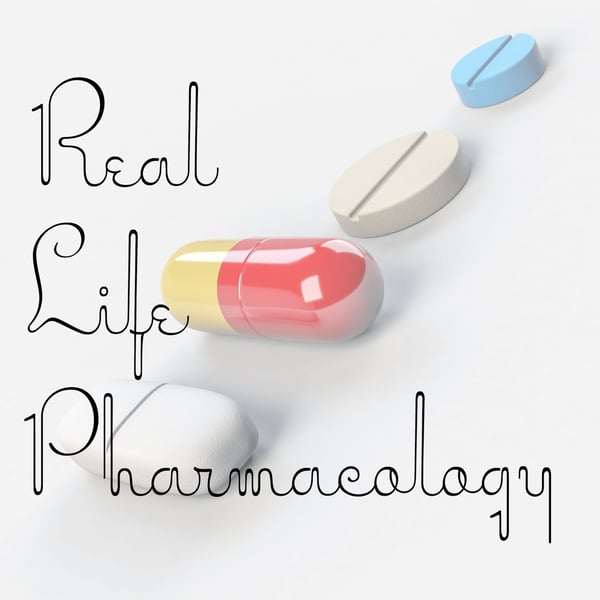Benztropine Pharmacology
Real Life Pharmacology - Pharmacology Education for Health Care Professionals
Eric Christianson, PharmD; Pharmacology Expert and Clinical Pharmacist
5 • 716 Ratings
🗓️ 25 July 2019
⏱️ 12 minutes
🧾️ Download transcript
Summary
Antipsychotics can cause extrapyramidal adverse effects that can help be managed with benztropine.
Because benztropine is highly anticholinergic, it can cause dry eyes, dry mouth, urinary retention, constipation and contribute to falls and confusion, particularly in our elderly population.
While benztropine is classified as an anti-Parkinson's agent, it is rarely used for that indication as it has a high incidence of anticholinergic adverse effects (particularly at the doses that are required for benefit).
Transcript
Click on a timestamp to play from that location
| 0:00.0 | Hey all, welcome back to the real-life pharmacology podcast. |
| 0:03.2 | I'm your host, pharmacist, Eric Christensen. |
| 0:06.8 | And today on the episode, I am going to cover Ben Stroping, |
| 0:12.5 | which the brand name for that medication is Cogentin. |
| 0:16.8 | Now, it's not a medication that's used incredibly often, |
| 0:20.1 | and at least in my practice, in my experience, |
| 0:25.2 | the most common situation I've seen it used for is drug-induced extraparaminal symptoms. |
| 0:34.8 | And the most common class of medications that cause these adverse effects are antipsychotics. |
| 0:41.9 | So these can be, you know, antipsychotics and obviously be super helpful in patients with |
| 0:47.2 | schizophrenia, for example, in reducing, you know, psychosis, hallucinations, delusions, things of that nature. However, they can |
| 0:57.2 | cause these movement adverse effects, which are called extra pyramidal symptoms. And so Benstropine |
| 1:05.9 | can be used to help manage this adverse effect. Now I do want to caution that the drug is not really |
| 1:16.1 | intended to be used for prophylaxis. So for instance, we don't give, you know, |
| 1:23.4 | risperidone and automatically give benzopine with it. We actually wait generally for these |
| 1:31.1 | patients to develop these adverse effects, and sometimes they don't have extra-paraminal symptoms, |
| 1:37.3 | but in the event that a patient is really, really responsive to the antipsychotic. |
| 1:48.9 | And we have maybe tried alternative agents, |
| 1:52.3 | and they're having these troublesome extraparaminal symptoms, |
| 1:55.3 | but we feel that the benefit of keeping it on board is actually worth it for the patient |
| 1:58.3 | in just managing those side effects. |
| 2:00.8 | So that's where |
| 2:01.5 | Benstropine I've seen it used most in that setting. Important differentiation, it is not recommended |
... |
Please login to see the full transcript.
Disclaimer: The podcast and artwork embedded on this page are from Eric Christianson, PharmD; Pharmacology Expert and Clinical Pharmacist, and are the property of its owner and not affiliated with or endorsed by Tapesearch.
Generated transcripts are the property of Eric Christianson, PharmD; Pharmacology Expert and Clinical Pharmacist and are distributed freely under the Fair Use doctrine. Transcripts generated by Tapesearch are not guaranteed to be accurate.
Copyright © Tapesearch 2025.

